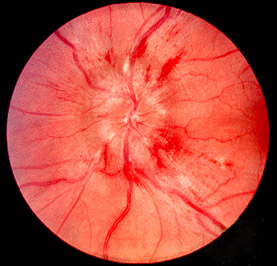
Papilledema Meaning, Causes, and Treatment
Papilledema Meaning refers to the swelling of the optic disc due to raised intracranial pressure inside the skull. This condition is often considered dangerous because it doesn’t always show early symptoms, and if left untreated, it can lead to vision problems or other complications. Your brain and spinal cord are surrounded by cerebrospinal fluid (CSF), which helps cushion and protect them. However, if there’s too much pressure in the brain, whether from swelling, a blockage, or another reason, it can press on the optic nerve, causing the optic disc to swell. Papilledema specifically refers to swelling that occurs only in the optic disc as a result of increased intracranial pressure.
Another reason why this optic nerve is important because the optic disc plays a key role in transmitting visual information to the brain; any swelling can lead to vision problems. Thus, this papilledema can cause vision loss and is very harmful and needs treatment as soon as possible. In this article, we’ll break down papilledema’s meaning, what causes it, how it’s treated, and why getting it checked by an eye specialist is crucial.
Papilledema Symptoms

So after you understand Papilledema meaning swelling of the optic disc, which often develops due to raised intracranial pressure inside the skull. In the early stages, it may not cause noticeable symptoms, but as the swelling worsens, it can lead to blurred vision, double vision, or even temporary vision loss. Many people experience headaches, especially in the morning or when lying down. Other signs include nausea, vomiting, and ringing in the ears (pulsatile tinnitus).
Now, if you have symptoms like severe or persistent headaches, sudden or progressive vision changes, frequent episodes of nausea and vomiting, and difficulty with balance, dizziness, or confusion, this means that pressure has built up in the brain and it is severely in need of urgent treatment. This is crucial not only because of this but also because nerve swelling can affect vision; therefore, it is crucial to seek medical attention for proper diagnosis and treatment.
Papilledema causes
Papilledema, meaning simply swelling, and this isn’t something that just happens randomly. It’s always linked to an underlying issue. Also, this condition is often connected with your brain. Let’s see the most common causes of papilledema.
- Idiopathic Intracranial Hypertension (IIH)
This is a condition where pressure inside the skull increases without any clear cause. It’s more common in younger women, especially those with obesity, and can lead to chronic papilledema.
- Medications
Some medicines, such as tetracycline (used for acne), steroids, and certain birth control pills, have been linked to increased intracranial pressure, which may lead to papilledema.
- Other Common Causes
Blood clots
If a blood clot forms in the veins that drain blood from the brain, it can block normal fluid flow, causing pressure buildup and nerve swelling.
Iron Deficiency
Brain tumors – A tumor can take up space and push against the brain, raising pressure.
Head injuries – Trauma can cause swelling or bleeding, leading to high pressure.
Meninges– These infections cause inflammation in the brain, which can increase pressure.
Papilledema Treatment
Since papilledema refers to optic disc swelling due to increased brain pressure, ignoring these symptoms could lead to permanent vision damage or a more serious neurological issue. Well, papilledema can always be treated with the right eye Doctor and the right care.
The treatment for papilledema can be based on its causes. If it’s due to high Intracranial pressure, then your doctor might suggest medications or ask you to manage your weight. As for people with idiopathic intracranial hypertension, even small amounts of weight loss can help reduce pressure. If the papilledema is due to any Underlying condition, then the doctor will treat that. It can be anything from a brain tumor, infections, or blood clots that may be causing nerve swelling. Papilledema, meaning the swelling of nerves, can always be treated, whether or not medications then surgeries are available.
Shunt placement or optic nerve sheath fenestration are two Surgeries that can help with the problem, but along with this, regular monitoring also plays a crucial role. Because the problem does not show any results, papilloma, meaning no swelling, which happens very slowly. Thus, it requires regular monitoring to keep a check off if something is wrong with your eyes.
Even after treatment, regular check-ups are important to ensure that papilledema isn’t returning. Eye doctors use tests like fundoscopy, optical coherence tomography (OCT), and MRI scans to monitor progress.
Papilledema Prevention
Preventing papilledema starts with taking care of your overall health, especially your brain. Since papilledema refers to optic disc swelling caused by increased pressure in the skull, managing risk factors is key. Stay on top of regular check-ups, especially if you have conditions like high blood pressure or obesity. Keep an eye on persistent headaches or vision changes—don’t ignore them! A healthy diet, staying active, and avoiding excessive salt can also help. If you ever notice unusual symptoms, don’t wait. Visit an eye hospital in Nagpur to get checked early. Your eyes and brain will thank you!
Conclusion
Papilledema isn’t something to take lightly—it’s your body’s way of signaling increased pressure in the brain, which can lead to vision loss if ignored. Since papilledema means simply swelling of the optic disc, identifying the cause and seeking timely treatment is crucial. Whether it’s due to high pressure, infections, or other neurological conditions, the right care can prevent complications. If you notice symptoms, don’t delay. Visit an eye hospital in Nagpur like ABO eye institute for proper diagnosis and treatment—your vision depends on it vision changes, visiting an eye clinic in Nagpur for early diagnosis can help.


